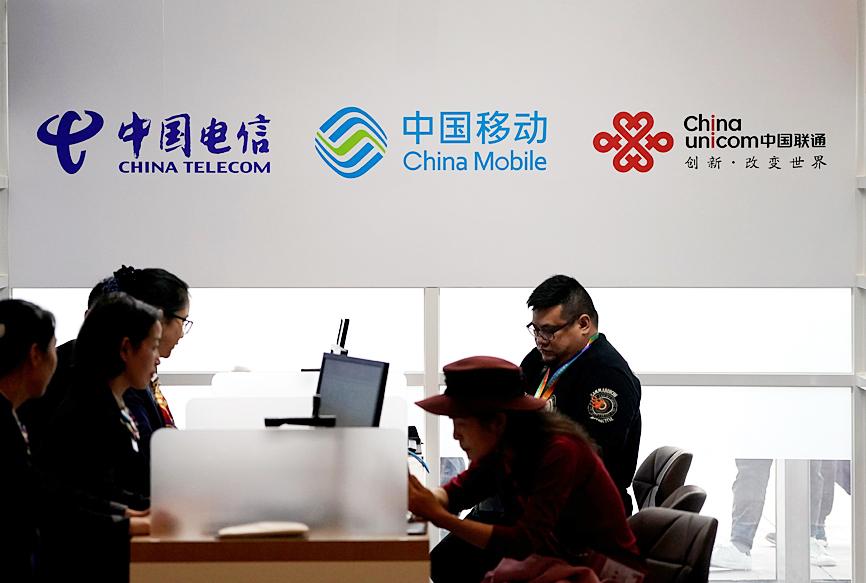China’s state-owned telecommunications companies yesterday declined in Hong Kong after the New York Stock Exchange (NYSE) said it is delisting them to comply with a US executive order that sanctioned companies identified as affiliated with the Chinese military.
Shares of China Mobile Ltd (中國移動), the largest of the three, fell as much as 4.5 percent to their lowest level since 2006, while China Telecom Corp (中國電信) dropped 5.6 percent. The two posted their biggest intraday losses since mid-November.
China Unicom Hong Kong Ltd (中國聯通) slipped 3.8 percent. The stocks pared most of those losses later in the day.

Photo: Reuters
The American depositary receipts (ADRs) of the three firms are set to be suspended from trading from Thursday to Monday next week, and the process of delisting them has started, NYSE said.
The nation’s oil majors including CNOOC Ltd (中國海洋石油) also fell on concerns they will be targeted next for delisting in the US.
“It’s largely a blow to sentiment” that could be temporary, said Mark Huang (黃澤航), an analyst at Bright Smart Securities & Commodities Group Ltd (耀才證券) in Hong Kong.
“Though the ADRs are not exceptionally large, there’s some impact on fundraising. Some passive index tracking funds may be selling to avert risk. More importantly, this is another reason to dump telecoms and pursue outperforming sectors,” Huang said.
The delisting is more of a symbolic blow amid heightened geopolitical friction between the world’s two largest economies, as they are thinly traded on the NYSE.
The companies also receive almost all of their revenue from China.
China’s securities regulator said that given the small amount of US-traded shares at each of the three telecoms, the effects on them would be limited and they are well positioned to handle any fallout.
The ADRs total less than 20 billion yuan (US$3.1 billion) and account for at most 2.2 percent of the total shares each, the China Securities Regulatory Commission (CSRC) said in a statement on Sunday.
China Telecom has 800 million yuan of ADRs and China Unicom has about 1.2 billion yuan.
“The recent move by some political forces in the US to continuously and groundlessly suppress foreign companies listed on the US markets, even at the cost of undermining its own position in the global capital markets, has demonstrated that US rules and institutions can become arbitrary, reckless and unpredictable,” the CSRC said. “It is certainly not a wise move.”
In separate statements yesterday, each telecommunications operator said it “regrets” NYSE’s actions, and said the decision might affect the prices and trading volume of the companies’ shares. All three companies said they had not received any notification from the NYSE about the delisting.
China Unicom and China Mobile said they are reviewing ways to protect the companies’ “lawful rights.” China Telecom said it is considering “corresponding options” to “safeguard the legitimate interests of the company.”
China yesterday said it firmly opposes the US government’s behavior of politicizing trade issues after the delisting.
Beijing will adopt the necessary measures to safeguard the legal rights of Chinese companies, Chinese Ministry of Foreign Affairs spokeswoman Hua Chunying (華春瑩) told a news conference in Beijing.
Additional reporting by Reuters

Stephen Garrett, a 27-year-old graduate student, always thought he would study in China, but first the country’s restrictive COVID-19 policies made it nearly impossible and now he has other concerns. The cost is one deterrent, but Garrett is more worried about restrictions on academic freedom and the personal risk of being stranded in China. He is not alone. Only about 700 American students are studying at Chinese universities, down from a peak of nearly 25,000 a decade ago, while there are nearly 300,000 Chinese students at US schools. Some young Americans are discouraged from investing their time in China by what they see

MAJOR DROP: CEO Tim Cook, who is visiting Hanoi, pledged the firm was committed to Vietnam after its smartphone shipments declined 9.6% annually in the first quarter Apple Inc yesterday said it would increase spending on suppliers in Vietnam, a key production hub, as CEO Tim Cook arrived in the country for a two-day visit. The iPhone maker announced the news in a statement on its Web site, but gave no details of how much it would spend or where the money would go. Cook is expected to meet programmers, content creators and students during his visit, online newspaper VnExpress reported. The visit comes as US President Joe Biden’s administration seeks to ramp up Vietnam’s role in the global tech supply chain to reduce the US’ dependence on China. Images on

New apartments in Taiwan’s major cities are getting smaller, while old apartments are increasingly occupied by older people, many of whom live alone, government data showed. The phenomenon has to do with sharpening unaffordable property prices and an aging population, property brokers said. Apartments with one bedroom that are two years old or older have gained a noticeable presence in the nation’s six special municipalities as well as Hsinchu county and city in the past five years, Evertrust Rehouse Co (永慶房產集團) found, citing data from the government’s real-price transaction platform. In Taipei, apartments with one bedroom accounted for 19 percent of deals last

US CONSCULTANT: The US Department of Commerce’s Ursula Burns is a rarely seen US government consultant to be put forward to sit on the board, nominated as an independent director Taiwan Semiconductor Manufacturing Co (TSMC, 台積電), the world’s largest contract chipmaker, yesterday nominated 10 candidates for its new board of directors, including Ursula Burns from the US Department of Commerce. It is rare that TSMC has nominated a US government consultant to sit on its board. Burns was nominated as one of seven independent directors. She is vice chair of the department’s Advisory Council on Supply Chain Competitiveness. Burns is to stand for election at TSMC’s annual shareholders’ meeting on June 4 along with the rest of the candidates. TSMC chairman Mark Liu (劉德音) was not on the list after in December last